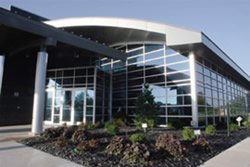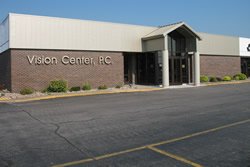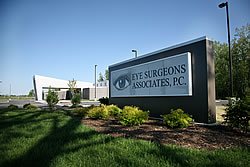Why do people consider lower eyelid surgery?
As we age, the fullness in our cheeks begins to fall and our lower eyelids often begin to appear puffy, or baggy. These changes can lead to a hollow area, or valley, between the lower eyelids and cheeks. To rejuvenate your lower eyelids, it is important to consider smoothing this valley between the eyelids and cheeks.
Lower eyelid surgery also known as lower eyelid blepharoplasty can help. A lower eyelid blepharoplasty targets the baggy lower eyelid tissue, helping to promote a smoother contour between the lower eyelids and cheeks. This can be an important part of overall facial rejuvenation.
What is a lower eyelid blepharoplasty?
In a lower blepharoplasty, Dr. Repp can remove excess fatty tissue filling the bags of the lower eyelids. Dr. Repp can also trim any extra skin from the lower eyelids that is helping to from the bags. Like all surgeries, there many approaches to rejuvenate the lower eyelids and cheeks. One common approach uses an incision hidden on the back of the eyelid to trim back excess fatty tissue filling the lower eyelid bags. Dr. Repp may also add an incision tucked beneath the lower eyelashes to remove excess lower eyelid skin.
Can lower eyelid blepharoplasty be combined with other surgeries?
A lower eyelid blepharoplasty is commonly combined with an upper eyelid lift (upper blepharoplasty). In patients interested in a lower eyelid blepharoplasty, it is common to have surgery on all four eyelids at once.
Will my health insurance pay for lower eyelid blepharoplasty?
Generally, health insurance companies view lower eyelid blepharoplasty as an elective, cosmetic procedure.
What should I expect the day of surgery?
Lower eyelid blepharoplasty is typically an outpatient, or day surgery, allowing you to recover at home following surgery.
Lower eyelid blepharoplasty surgeries are commonly done in an ambulatory surgery center. Dr. Repp will work with you to customize a plan to help keep you comfortable during surgery. Most patients receive medication to help maintain general comfort during the procedure (IV sedation). They will also get medication to anesthetize the eyelids.
After surgery, most patients will return home the same day for recovery.
Can you tell me about the recovery and aftercare?
Each patient is unique, so Dr. Repp will customize an after-care plan for you, but some general guidelines follow. Ask Dr. Repp if these apply to you before following any of the recommendations on this site. And if something does not seem right, do not hesitate to call Dr. Repp.
Most patients will use frequent cool compresses for the first two days after surgery. During this time, Dr. Repp will likely ask you to limit activity, commonly recommending that you avoid any heavy lifting or bending. These activities can stress your surgery site and set back your healing back. Following surgery, most patients experience only mild-to-moderate discomfort that can often be effectively treated at home with medications recommended by Dr. Repp. If you experience more than mild pain or discomfort, you should call Dr. Repp immediately for recommendations. You will also need regular ointment on your incision line. The ointment acts as a salve, soothing the eyelids as you heal.
Many patients wonder when they can safely return to work or other normal activities. There is no single answer for every patient, so ask Dr. Repp for details. The same is true for when patients can return to wearing their contact lenses, although many patients can begin wearing their soft contact lenses by two weeks and their hard lenses by one month. Check with Dr. Repp to see if these guidelines apply to you. Lastly, Dr. Repp will place sutures during your surgery. Typically, these dissolve within a few weeks following surgery. Ask Dr. Repp for details.
Conclusion:
Lower eyelid blepharoplasty surgery is a common procedure performed by ophthalmic plastic and reconstructive surgeons. In some patients, it can help improve the aesthetic harmony of the eyelids and cheeks. Schedule an appointment with Dr. Repp to find out if you are a good candidate.




